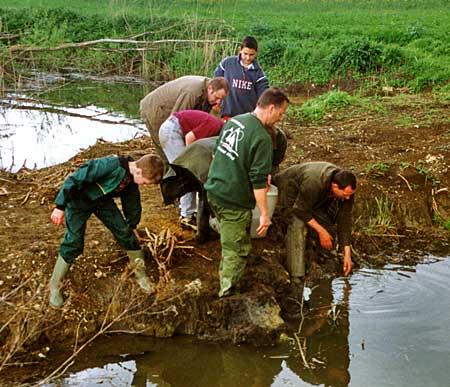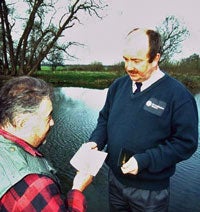| RULES IS RULES! How many anglers complain about the rules of the club they are in? Lots of them, so isn’t there something wrong with the amount of rules that some clubs want to impose and why they want to inflict them on their members? CONSTITUTIONAL RULES That last one may surprise you and you may well ask why, but let me give you a scenario. A club has existed for years and has been very successful, a few waters and thousands of pounds in the bank. Not many attend the meetings and there is a rule that states a simple majority carries any motion. A group of newcomers attend a meeting and outvote the old timers on a motion they propose to wind up the club and split the funds between existing members. Once passed this MUST be done and your new boys could walk away with a few hundred pounds in each of their pockets. You have to prevent this happening, so you need a good rule. These constitutional rules should also stipulate when, approximately, the AGM should be held each year, eg, the first Tuesday of May, and when the financial year of the club should end. What you must also remember is that your club does not exist in law except in one case – when the club becomes incorporated as a Limited Company. Normal clubs are termed a ‘Society’, no-one can sue the club or take them to Court on any matter, but if anyone wants to take action they can do it against a ‘Trustee’ of the club or other individual. Therefore there should also be rules to protect the trustees and committee of the club so that should any legal action be taken against one of them, the club will underwrite all costs and expenses. All of the club’s assets are also in the trust of the trustees so perhaps you should bear that in mind, stop them from selling the ‘Family Silver’ and pocketing the cash. Moreover, all the clubs licences are held by the trustees even though they are made out in the name of the club. For further reading about the responsibilities of the trustees and committee members of fishing clubs, may I refer you to the best book yet published entitled ‘Angling & The Law’ by Peter Carty and Simon Payne, Merlin Unwin. I extracted their wording for a set of club rules and from them formulated my own less wordy set, if the authors will pardon me saying so. This set, or certain of the rules, has since been adopted by a number of societies and I believe they are concise enough now. If you want a sample set in MS Word format either drop me, or the editor of FISHINGmagic, an email, but buy the book anyway because there is a lot more to it that could save you a fortune in legal advice. FISHING RULES As for general fishing conduct rules I believe that the fewer there are, the better. Many clubs have a barbless only policy, no braid, no groundbait, no legers, no spinning, no keepnets, and strictly no fun. Get the point? I would prefer to rely on the bye-laws of the regional Environment Agency Fisheries Department, they usually make good sense and are enough. Other than that, try educating your members a little better if you have any problems. There are also some, what I think, crazy rules about cutting down bankside growth. Now whilst I would agree that we don’t want everyone going to the swims and carving out great swathes of greenery and chopping down trees there must be some allowance to keep the more popular swims neatly cut back. If the club won’t do it on organised work parties then they should allow the members to do it for themselves. All this nonsense about tying the growth back and then restoring it afterwards is time wasting and causes disturbance to the fishing, especially if you’re likely to move a few times on a roving mission. Anyway, these rules, as I say, are personal to your club, but don’t please let some old chap (probably doesn’t even fish anymore) off the top table dictate what everyone should and shouldn’t be doing because everyone’s too scared to upset him. Also, if the owners of your lakes and ponds have no objections to fishing throughout the year and it is the wish of the majority, then please open them up. Similarly if you’re in a club where you think there is a lot of highly restrictive rules, why not get a big bunch of like-minded anglers together, turn up at an AGM and get yourself on the committee. PUBLISHING THE RULES You will have to make those rules available to him (or her) if they request them. They can be photocopied onto A4 sheets if you wish and you can make a charge for supplying them and to cover postage. This will save all those heavy printing bills and any rules specific to a fishery might be placed on a notice at the venue concerned. On this last point you can buy an A4 or A3 laminator, print the rules from your PC, encapsulate them in waterproof plastic and staple them to a decent notice board at the fishery. It’s a damn site cheaper and if a rule changes, it’s easy enough to reprint the new rules and replace the old ones. Also, if it’s at the fishery, no one can say they never saw the rule! INSURANCE No matter how your club is organised or what waters it controls, even if you don’t have any, you should organise insurance for your members. The main type of insurance is Public Liability. This is to protect the public from accidents caused or created by the angler and can even be angler to angler. Don’t for one minute think that everyone is covered by their house contents insurance, they’re most probably not. For the cost involved it is far better to ensure that all the clubs members are covered by the one insurance policy.
The other type of insurance you should consider is Employer’s Liability. I can hear you now saying “We don’t employ anyone, why do we need that?” True enough, you probably don’t pay anyone directly but you do ask people to work for you, ie, bailiffs and work parties. When they do that work, even though it is purely voluntary, they are your employees. If something goes wrong and someone gets hurt or even loses something, YOUR CLUB is responsible. Remember what I said above about the club not existing in the eyes of the law? That’s true, but the claimant can take one of the trustees or work party organiser to Court to seek compensation, and we live in a world dominated by compensation these days. For the additional cost your club must be insured for Employer’s Liability. You might say that you have existed for the past 30, 40 or 60 years with an unblemished record, but you only need one accident, one death even and it’s the end of the road for the club and in particular, the organiser responsible. Whatever other insurance you take out, premises insurance (if you have them), insurance against theft of club property (strimmers, cups, etc) that’s entirely up to you. They’re mere items that can be replaced, but when someone’s life could be at stake you had better think twice. If you join the National Association of Fisheries and Angling Consultatives (NAFAC) you will be offered a low cost highly beneficial scheme that will cover all of the above contingencies. Call them now on 01553 829411 or write to NAFAC, Moat House, Station Road, Walpole Cross Keys, KINGS LYNN, Norfolk PE34 4HB. Sure that’s a plug, but one that could save your club!!! BAILIFFS, JUST WHO DO THEY THINK THEY ARE? So, you appoint bailiffs. They go round and collect day tickets fees, check members tickets, check tackle for any infringements of the rules, cut tickets, withdraw tickets, and inform the committee as to the actions they have taken. Just what power does a club bailiff have once he is given a special bailiff’s card? One simple answer – NONE!
But your average club bailiff is just another man in the street. He daren’t evict anyone from a fishery, he has no powers to search anyone on a fishery, he cannot demand to see someone’s hook for a barb, and he cannot even demand to see a membership card! All he can do is to rely on the fair mindedness of the members and the general public and hope they cooperate with him. If he were to touch them in any way he could be later charged with assault. If a bailiff wants anything done about someone who refuses to pay for a ticket and refuses to leave, all he can do is to call the assistance of a policeman. In such a case the offender can be charged under the Theft Act as he is taking advantage of a supply that the club has paid for whilst he himself is not prepared to pay for it. If it’s another member he has a dispute with then there is nothing he can do except to report the incident to the committee at the next opportunity. It would be as well if you made this point clear to all of your bailiffs. After all, rules is rules! Next – ‘Developing Fisheries’ |
Welcome!Log into your account












